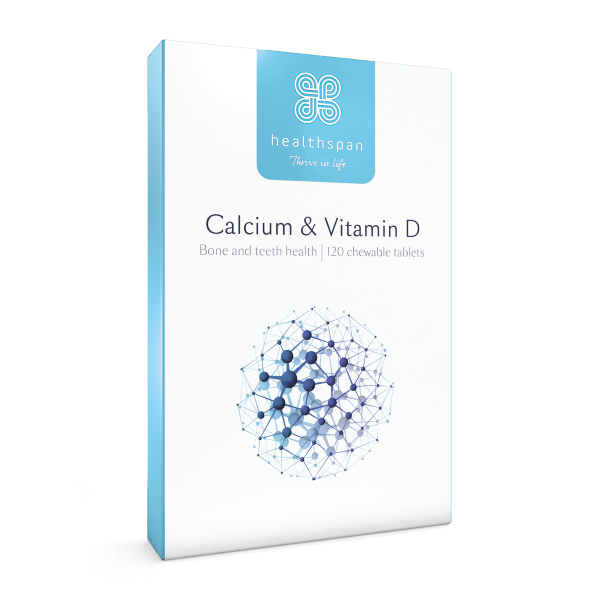The benefits of calcium, what happens if you're deficient, how to get calcium from your diet and what supplements are available.
Calcium has so many structural and metabolic roles in the body that we each harbour around 1.2kg of the mineral – more than any other – most of which is stored in our skeleton as hydroxyapatite.
Although 99 per cent of the dietary calcium you absorb goes straight into your bones and teeth, the other 1% is vital for blood clotting, muscle contraction, nerve conduction and the production of energy.
Calcium-rich foods
The best-known sources of calcium are cows' milk and dairy products, but it is also found in eggs and tinned salmon (if the tinned salmon includes the soft bones).
For those who follow a plant-based diet, or who have lactose intolerance, calcium can also be obtained from nuts and seeds, pulses, bread made from fortified flour and green leafy vegetables, especially broccoli (but not spinach, whose oxalate content reduces its uptake).
Some types of dietary fibre (phytates from wheat in unleavened breads such as chapati) also bind to calcium in the gut to reduce its absorption.

Did you know? A pint of skimmed or semi-skimmed milk contains around 720mg calcium – almost all your daily requirement.
The role of vitamin D
Calcium is only absorbed from your small intestine when sufficient vitamin D is present. Good intakes of both calcium and vitamin D are therefore vital throughout life to build strong bones and to help prevent bone thinning in later life.
Vitamin D regulates calcium metabolism and normal blood levels by:
- Increasing absorption in the small intestines
- Regulating calcium reabsorption in the kidneys
- Regulating secretion of parathyroid hormone, which releases calcium from bones

Calcium and Vitamin D
Chewable tablets for bone and teeth health
- Calcium and vitamin D to support teeth and bones
- Added vitamin K to help maintain bone health
- Helps reduce the loss of bone mineral linked to menopause
Benefits of calcium
Bone health
You need sufficient calcium to build strong bones and to help prevent bone loss in later life.
A large analysis of clinical trials involving almost 31,000 adults suggested that calcium supplements (taken together with vitamin D) can reduce the rate of bone loss and reduce the risk of all types of fracture by 15% and of hip fracture by 30%.1
Calcium supplements are therefore a good idea for middle-aged and older adults, including postmenopausal women.
What else can calcium help?
Calcium also has a key role in ensuring healthy blood clotting, cell division and specialisation, muscle contraction, nerve transmission, the production of energy and for digestive enzymes to work properly.

Did you know? Vitamin K2 helps to ensure calcium is moved away from the arteries and laid down in the bones.
How much calcium do I need per day?
The nutrient reference value (NRV) for calcium is 800mg per day. Some studies have suggested that the most effective doses for preventing bone loss in later life is 1200mg calcium plus 800IU (20mcg) of vitamin D.2
The total calcium safe upper limit from both food and supplements (the level that has not been associated with any harm) is 2,500mg per day. The upper safe level for long-term use from supplements alone is suggested as 1,500mg calcium per day.
Calcium deficiency
If you avoid dairy foods due to intolerances or are cutting back to lose weight, you may not get your full calcium requirement.
If you are lacking in vitamin D, you will not absorb calcium well, either.
Vitamin D deficiency is widespread in the Irish population, in all demographics:3,4,5
- 47% of 18-39 year olds
- 35% of 50-59 year olds
- 64% of over 80s
- More than 67% of nursing home residents
- 93% in Irish BAME (black, Asian and minority ethnic) communities
As severe vitamin D deficiency remains an issue, it's therefore important to follow government advice to take a vitamin D supplement.
When intakes of calcium (or vitamin D) are low, the body attempts to replenish blood levels by leaching calcium from your bones, leading to thinning (osteoporosis). Those at greatest risk of calcium deficiency include women (especially those who are pregnant, postmenopausal or who have an eating disorder), individuals with milk allergy or lactose intolerance, adolescents and the elderly.6
Low intakes of calcium are also linked with muscle aches and pains, twitching, spasm and cramps, heart palpitations, high blood pressure, osteoporosis, gum disease and loose teeth.
Calcium supplements
Supplements that contain calcium carbonate provide the most elemental calcium at 40mg per gram, and this is generally well tolerated and absorbed, especially when taken with food.7
Calcium citrate provides 21mg elemental calcium per gram, although this lower calcium content is partly compensated by greater absorption.
Calcium lactate contains 13mg per gram, and calcium gluconate 9mg per gram.8
Calcium tablets usually include other bone-friendly nutrients such as vitamin D3, vitamin K2, magnesium, boron, copper and zinc.
Select a supplement made to pharmaceutical standards (GMP) to ensure it provides a consistent dose that meets label claims.
How to take calcium tablets
Calcium tablets are best taken with meals. Some evidence suggests that they are better taken with an evening meal rather than breakfast, as the movement of calcium in and out of cells is greatest at night, when growth hormone is secreted.
If taking a high dose, however, it is usually best to divide it into two or three smaller doses spread throughout the day to maximise the amount you absorb.
Those taking certain medications, such as tetracycline antibiotics, need to ensure they do not eat or drink calcium-containing foods for at least an hour either side of taking their medication. This is because calcium binds with some tetracyclines to reduce their absorption.
Safety: can I take too much calcium?
Some studies have found a slightly increased risk of heart disease in people taking calcium supplements, but others have not. Studies finding a link have tended to take place in countries where vitamin D deficiency is common, such as Sweden, where up to one in two people are lacking in vitamin D during the winter months.9
According to the National Osteoporosis Foundation and the American Society for Preventive Cardiology, calcium supplements (with or without vitamin D) have no harmful effects on the risk for cardiovascular and cerebrovascular disease in generally healthy adults if calcium intake (from food plus supplements) does not exceed 2,000mg per day, and should be considered safe from a cardiovascular point of view.10,11
People with a known tendency to form kidney stones should seek advice before taking calcium supplements (and drink sufficient fluids).12





